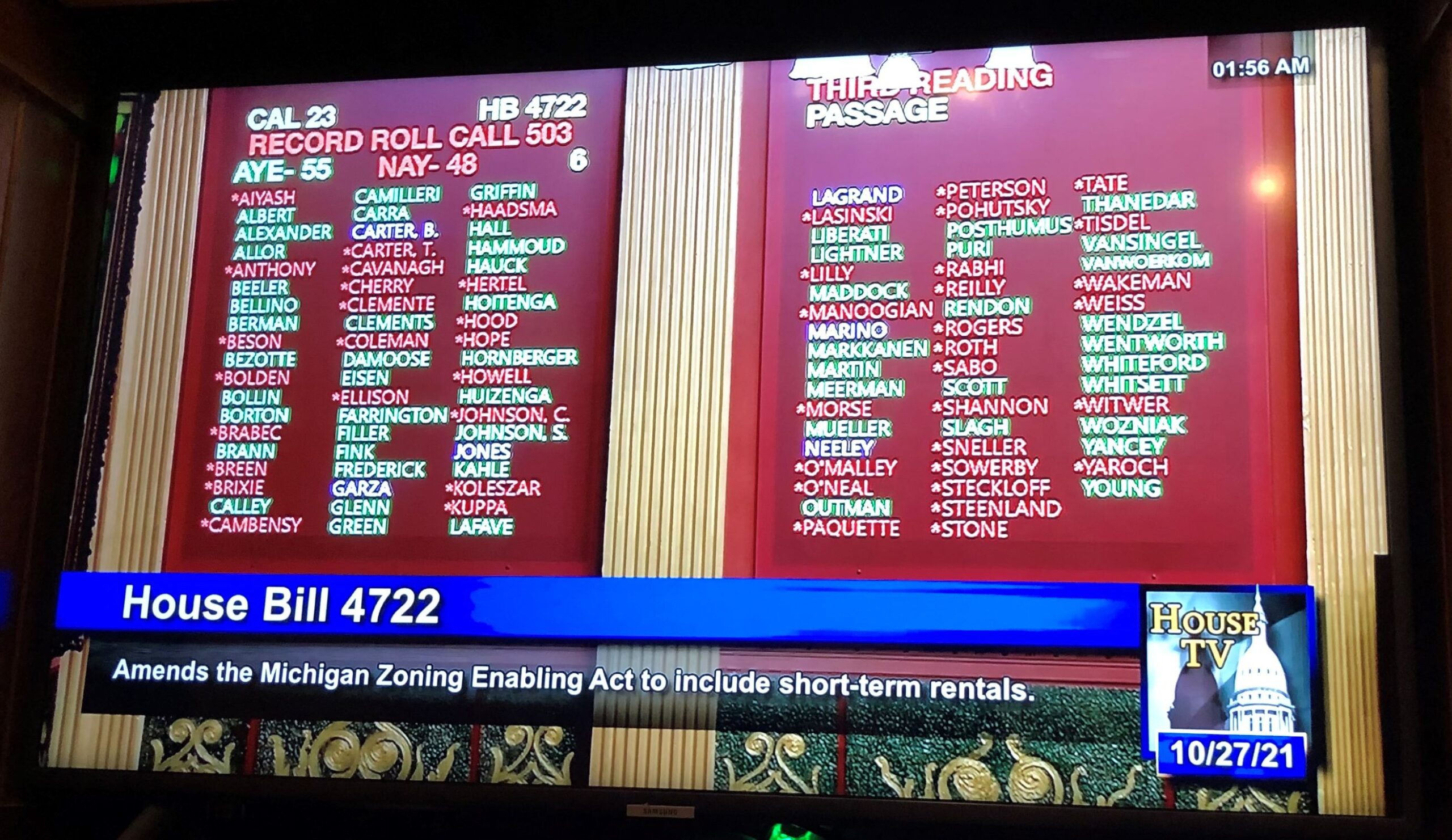Short-term Rental Preemption Bill Passed By House
By: Dene Westbrook,
October 27, 2021
While most people were sleeping the state House passed House Bill 4722(H-11) by a vote of 55-48.
The legislation states a short-term rental is a residential use of property and a permitted use in all residential zones. It is not subject to a special use or conditional use permit or procedure different from those required for other dwellings in the same zone. It is not a commercial use of property. Furthermore, for the purposes of zoning, these changes include short-term rentals, but is not limited to just short-term rentals.
The bill allows a local unit of government to limit the number of units under common ownership used for short-term renting, but the limit set must allow for at least 2 units per person. While this may appear to allow municipalities to protect neighborhoods from an oversaturation of short-term rentals, the definition of common ownership is an issue. It states “ownership in whole or in part by the same individual, individuals, or legal entity“, so with minimal tweaking of ownership structures, setting up LLCs, someone would be able to have an unlimited number of short-term rental units in your community. This is not helpful.
The bill also states a local unit of government may limit the total number of units used for short-term rentals, but the limit has to be set at 30% (or higher) of the number of existing residential units in the community and the percentage shall be applied without regard to the location. This language would allow for approximately 1 in every 3 units to be a short-term rental. It does not give municipalities the ability to spread those short-term rentals throughout the community. Neighborhoods could be overrun with vacation rentals. Explain to your legislators how this provision will be administered and enforced at the local level. Ask your municipal attorney if a property right can be given to 30% of the people, but witheld from the remaining 70%? How do you decide who is given this right if you have more than 30% wanting it? This provision is ripe for litigation.
There is also a carve out in the bill for a local unit of government that, as of July 11, 2019, had zoning ordinance provisions that regulate the rental of dwellings by overlay district without distinction between short-term and rental for longer terms, the ability to continute to enforce those zoning ordinance provisions. If your Representative voted for this bill, does this carve out actually help your community, or did they vote to give one community the ability to continue to regulate the way they are now, but not you?
The following statement was released by Michigan Municipal League CEO and Executive Director Dan Gilmartin after the late-night vote.
“The after-midnight vote by the Michigan House of Representatives to pass House Bill 4722 is an attack on families and the communities they call home. For months, community leaders and their coalition partners throughout the state have proposed compromise legislation on the short-term rental bills that would allow for appropriate and safe rental units across Michigan. The bill approved in the dark hours of Wednesday morning ignores these solutions and instead opens the flood gates to unregulated commercial-style rental units on every block in every community in our state. Who gains from commercial interests getting full access to our residential homes for revenue generating short-term rentals? Commercial investors, out-of-town business interests, and real estate brokers. Who loses? You and your community.
“This calamity is entirely avoidable. This bill will pour lighter fluid on an already red-hot housing market should it become law, making it even harder for families to put roofs over their heads. Those voting yes on this legislation hold the responsibility for the entirely predictable and disastrous outcomes this measure will produce. Michigan residents deserve better. We implore the Senate to reject this rolling disaster headed to a neighborhood near you.”
The League will continue to diligently work this issue. Please thank your Representative if they stood strong by voting no, and engage your representative if they were a yes vote to make sure they understand the implications of what they supported. It is also time to talk to your Senator, so they have a full understanding of what the House has sent them for consideration.
Jennifer Rigterink is a legislative associate for the League handling economic development, land use and municipal services issues. She can be reached at [email protected] or 517-908-0305.
